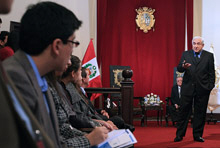
Typical street scene in Santa Ana, El Salvador. (Photo: iStock)
IMF Survey: Growth Returns to Latin America, Says IMF Chief
May 27, 2010
- Region managed global crisis well
- IMF chief met with students to discuss global economy
- Students challenge Strauss-Kahn on role of IMF during recent crisis
Latin America managed the global economic crisis well, with the right policies, and growth has returned to the region as the global economy recovers, IMF Managing Director Dominique Strauss-Kahn said during a town hall-style dialogue with students in Latin America.

Strauss-Kahn speaking to students in Lima: growth has returned to Latin America as the global economy recovers (photo: AFP)
Strauss-Kahn Visits Peru
But growth may not be enough. You also need to implement the right policies in the areas of education and other social services, he said on the first day of his trip to Peru.
“When you have growth on the one hand to provide the resources, and on the other hand the willingness of having some fairness in its distribution, then the result is a reduction in poverty.”
Strauss-Kahn, on the second leg of a week-long trip to Latin America, told the students there is an absolute link between a country’s growth in the long run and education levels, “so your role is to go on doing what you’re doing, and assume the leadership in your countries, because the future is in your hands.”
IMF reaches younger audience
The televised town hall meeting was held at the Universidad Nacional Mayor de San Marcos, the oldest officially established university in all of the Americas. The meeting is part of an outreach campaign, Ask the IMF, inviting students in the region to submit questions to the Managing Director on issues of importance to them. After only 10 days, the IMF received over 1,000 questions from students in 11 countries.
“I’m here to listen and ask you what you think, and to learn what your concerns and interests are,” Strauss-Kahn told the audience of over 100 students and faculty. “No question today is taboo.”
Global cooperation in the recent crisis
Students asked the Managing Director questions about the recent economic crisis. They wanted to know about the role of the IMF during the crisis and about the risks linked to debts in European countries, such as Greece.
“If we had not had the IMF during the crisis, I am convinced the situation would have been much more difficult because it would have been harder to get countries to act together,” said Strauss-Kahn. He reminded his audience that the IMF is a unique global institution dealing with both economic issues and the financial sector and said the more the world becomes globalized, the more it will need multilateral institutions.
Addressing student questions on Greece, Strauss-Kahn said if action had been taken sooner to fix the problem, there would have been a solution at a much lower cost to the country.
Asked what the IMF would be like in the years ahead, Strauss-Kahn said he foresees a “more relevant, more democratic IMF, with stronger tools—and me as head with a long white beard.”
In closing remarks, he told students “the future of your countries is bright, and is on your shoulders,” and they will have to work hard to make their countries better.
Boost to growth is key
Earlier in the day Strauss-Kahn met with President Alan Garcia, Finance Minister Mercedes Araoz, and Central Bank Governor Julio Velarde.
“With a recovery underway that will see growth in Peru of between 6-7 percent this year, the challenge now is to manage success by continuing the timely and gradual phasing out stimulus and avoid the build-up of inflationary pressures,” the IMF chief said after his meetings.
On May 26 in Brasilia, the IMF chief said sustaining high levels of growth is “good for Brazil, good for South America and it has to be good for the world.”
The Brazilian capital was the second and final stop on the IMF Managing Director’s visit to Brazil, where he met with President Luiz Inácio Lula da Silva, and with Finance Minister Guido Mantega.
In remarks to reporters after his meeting with the president, Strauss-Kahn also stressed the importance of economic growth for the global recovery.
“It was useful for the Europeans to have created the European Stabilization Fund as a backstop for countries that have problems, but at the same time, the money should be used to boost growth, because without growth, it will be difficult to get out of the crisis,” he said.
While in Lima, Strauss-Kahn will also appear in a televised round table discussion with several regional finance ministers to discuss global challenges ahead of his address to the meeting of finance ministers of the Americas and Caribbean on May 28.


